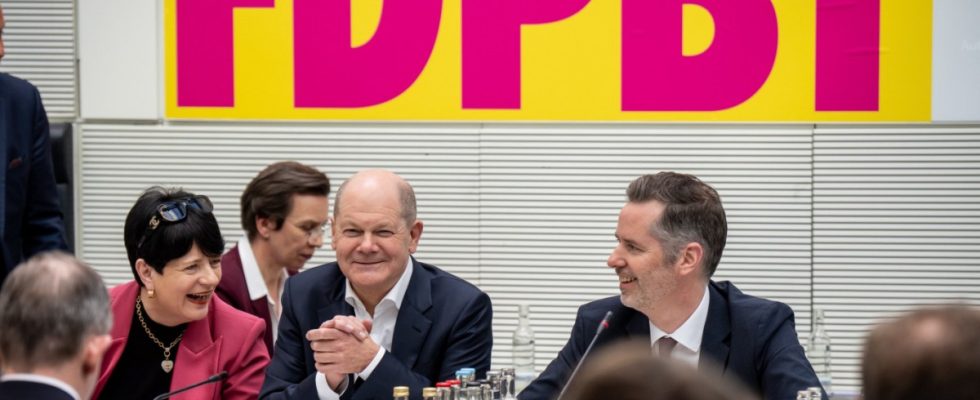The Chancellor walks past the glass dome of the Reichstag with a serious expression, over to the hall of the FDP parliamentary group, with a crowd of cameramen behind him and bodyguards next to him. In the hustle and bustle, he initially misses faction leader Christian Dürr in the entrance area, who runs after him and then greets him. There is friendly but somewhat weak applause for Olaf Scholz. However, one person who looks particularly grim when she sees the Chancellor is Marie-Agnes Strack-Zimmermann.
She has to hear a few things from the SPD right now: that as chairwoman of the Defense Committee, she allowed 105 people to attend the secret special meeting on the Russian eavesdropping attack on four Bundeswehr officers, which discussed details of a possible delivery of Tauruscruise missiles went to Ukraine. From this meeting, information classified as secret was passed on to the portal by Inspector General Carsten Breuer T Online pierced. In a distorted interpretation according to participants, for example that the entire target data programming is complex and important technical components of the Bundeswehr would be missing if they were given to Ukraine. This could then pose a risk to one’s own defense capability and therefore national security.
Since this clearly supports the Chancellor’s course of rejecting Taurus deliveries, some defense politicians suspect that the SPD has betrayed secrets – which is why Strack-Zimmermann and the 105 participants are now being made a big issue from this side. And so the Chancellor’s rare visit to the Liberals in the Bundestag is also a signal that the traffic light is once again unstable and that there are heated arguments about the course towards Ukraine.
The FDP said they wanted to “start a conversation” with the head of government
FDP parliamentary group leader Dürr had previously said that they wanted to “start a conversation” with the head of government – and that was successful, without an open settlement, as we can hear. But when the FDP MPs later rush out to finish work, they are unusually taciturn, it seems like a muzzle – they are trying to close ranks again. Scholz stays true to himself inside and tries to calm down objectively. All policy areas were discussed, without attacks, it went “humanly well,” said one participant, as the Chancellor was bid farewell after around two hours and with applause. Another commented that it was friendly, even humorous, but that there was a lot of agreement, but there were also differences.
It’s a typical Scholz appearance; behind closed doors he can certainly convince; It also suits him that before his appearance at the FDP he gave a speech that was appreciated by many here. At the Hayek Society, he emphasized that renewable energies would have to assert themselves more on the market and get by with less funding. “It cannot be the case that a central economic sector such as energy production, which will soon be 100 percent renewable, is subsidized,” said Scholz. It was absolutely right that he opposed a subsidized industrial electricity price of six cents per kilowatt hour. The SPD and the Greens had demanded this. “Today, electricity prices on the spot market are already at this level again, and the futures markets are expecting a further fall,” said Scholz.
Inside the FDP, he is also not trying to enforce the increasingly loud demands from his own party for a comprehensive reform of the debt brake, which would open up new financial leeway. The traffic light coalition is currently looking for ways to create another relief move – but there is a lack of money for an economic stimulus program. The next major dispute is looming over the 2025 budget, with Finance Minister and FDP leader Christian Lindner insisting on further billions in savings.
50 of 91 FDP MPs voted against the “Taurus” delivery solely for coalition reasons
And the biggest disagreement remains – even the Chancellor’s appearance with his coalition partner cannot cover it up. Last week, in the Taurusdebate in the Bundestag, it became clear how big the differences are between Scholz and his SPD on the one hand and the FDP and the Greens on the other. SPD parliamentary group leader Mützenich even asked whether there should be talk about freezing the war, which the Greens and Liberals strictly reject. At least 50 of 91 FDP MPs have made personal declarations in the Bundestag that they are in favor of one Taurus– delivery, but would bow to the Chancellor’s no because of coalition reasons – Strack-Zimmermann and Bundestag Vice President Wolfgang Kubicki have meanwhile voted for the Union’s motion for a delivery.
Before Scholz took a seat in the front row of the FDP parliamentary group next to parliamentary group leader Christian Dürr, Rolf Mützenich had again handed it out in the direction of Strack-Zimmermann. You, Strack-Zimmermann, are really responsible for a manageable, small area and “this time too, you did not manage to keep a secret meeting as secret as necessary.” And then there is also a letter that she wrote to Bundestag President Bärbel Bas (SPD) about the possible betrayal of secrets at the special meeting of the Defense Committee on March 11th. It was made available to the “interested public” before it reached the President of the Bundestag.
“I don’t know what Ms. Strack-Zimmermann’s mail routes are like,” said Mützenich, “but perhaps she will give us some information about it in the future while she is still here.” To the undisguised delight of many in the Chancellor’s Party, the controversial champion of comprehensive support for Ukraine is the FDP’s top candidate for the European elections in June – and will then move to Brussels. She probably won’t miss Scholz in the Bundestag either.

